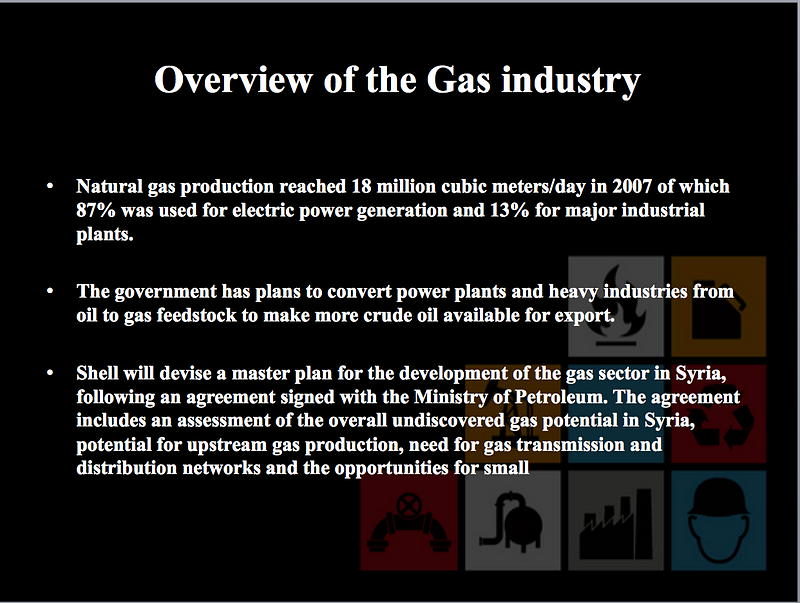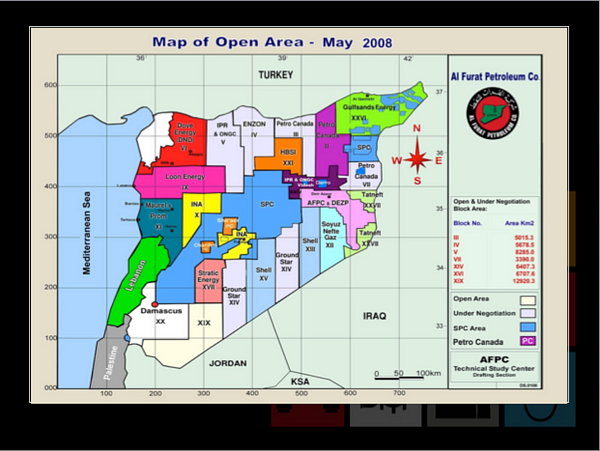Western energy majors court Assad
CGGVeritas was also licenced by the British government for the North Sea, where for the last several years Bowman has held responsibility for identifying prospectivity and coordinating licencing round activities.
In 2012, the US Department of the Interior published a US Geological SurveyMinerals Yearbook, which observed that Assad’s government-owned Syrian Petroleum Co.:
“… cooperated with several international oil companies, such as Chinese National Petroleum Co. (CNPC), Gulfsands Petroleum of the United Kingdom, Oil and Natural Gas Resources Corp. of India, Royal Dutch Shell plc. of the United Kingdom, and Total SA of France through subsidiary companies.”
Two years earlier, the Syrian capital, Damascus, was host to the 7th Syrian International Oil & Gas Exhibition, convened by Assad’s Ministry of Petroleum. The exhibition was sponsored by CNPC, Shell, and the French major Total, and was attended by over a hundred representatives of international firms, 40% of whom were based in Europe.
A 2010 draft document produced on behalf of the Syrian Ministry of Petroleum by the exhibition organiser, Allied Expo, described how British company Shell was planning to work closely with the Assad regime to develop Syria’s gas production:
“Shell will devise a master plan for the development of the gas sector in Syria, following an agreement signed with the Ministry of Petroleum,” say the presentation slides, created in October 2010 to promote plans for a new oil and gas exhibition in 2012. “The agreement includes an assessment of the overall undiscovered gas potential in Syria, potential for upstream gas production, need for gas transmission and distribution networks…”

Throughout 2010, Shell officials held numerous meetings with British government ministers. In July, Shell met David Cameron to discuss “business issues”, Foreign Office minister David Howell to discuss “international energy matters”, and Charles Hendry, minister of state at the Department of Energy and Climate Change (DECC).

Such meetings with multiple government departments and often dozens of senior officials continued for every month through to the end of the following year, except June 2010. These included meetings with the Prime Minister’s National Security Advisor Peter Ricketts; business secretary Vince Cable, various DECC ministers to discuss “energy issues” related to Qatar, along with several sessions with Cameron and Chancellor of the Exchequer George Osborne.
Declassified British government memos show that in the run-up to the 2003 Iraq invasion, oil firms BP and Shell held several meetings with senior government officials to guarantee a role of British energy companies in post-conflict Iraq.
While publicly the government decried criticisms of an oil motive for British involvement in the war as “the oil conspiracy theory”, one memo of a meeting between then Trade Minister Baroness Symons and UK oil firms revealed that in private, they believed “it would be difficult to justify British companies losing out in Iraq in that way if the UK had itself been a conspicuous supporter of the US government throughout the crisis.”

After the 2011 protests, even when Assad was brutalising demonstrators in the streets, then Secretary of State Hillary Clinton ruled out military intervention and insisted that the Syrian dictator was a “reformer” — which he took as a green light to escalate his crackdown.
As the cycle of violence intensified, Western governments disassociated from Assad when it became clear his rule had become completely unstable. With the outbreak of civil war, the plans of Shell and other oil majors to open up Syria’s offshore resources were unexpectedly suspended.
Military action to protect Mediterranean oil and gas
The sudden crisis in Syria threw a spanner in the works for longstanding efforts to explore and open up lucrative energy resources in the Eastern Mediterranean.
A report published in December 2014 by the US Army’s Strategic Studies Institute (SSI) provides compelling evidence that American, British and Gulf defence strategists see the Mediterranean as an opportunity to wean Europe off dependence on Russian gas, and boost Israel’s energy independence.
As part of this process, the report revealed, military action is viewed as potentially necessary to secure Syria’s untapped offshore gas resources, which overlap with the territorial waters of other Mediterranean powers, including Israel, Egypt, Lebanon, Cyprus, Greece and Turkey.
The report by Mohammed El-Katiri, an advisor to the United Arab Emirates Ministry of Defence and formerly a research director at the UK Ministry of Defence’s (MoD) Advanced Research and Assessment Group (ARAG), explicitly acknowledges that a post-conflict Syria would open up new prospects for energy exploration.
“Once the Syria conflict is resolved, prospects for Syrian offshore production — provided commercial resources are found — are high,” wrote El-Katiri. Potential oil and gas resources can be developed “relatively smoothly once the political situation allows for any new exploration efforts in its offshore territories.”
The US Army SSI report noted that Syria’s offshore resources are part of a wider matrix of oil and gas deposits in the Levant basin encompassing the offshore territories of these competing states.
The region is estimated to hold approximately 1.7 billion barrels of oil and 122 trillion cubic feet of natural gas, which could be just a third of the basin’s total hydrocarbons.
US-led military intervention has a key role to play, the report concludes, in “managing” conflicts and tensions in the Eastern Mediterranean, especially the prospect of “Syria destabilising into de facto civil war.”
“US diplomatic and military support has a pivotal role to play in the East Mediterranean’s complex geopolitical landscape, and its importance will only grow as the value of the natural resources at stake increases,” the Army SSI report said:
“US security and military support for its main allies in the case of an eruption of natural resource conflict in the East Mediterranean may prove essential in managing possible future conflict.”
Neocons angling for Syria’s Golan oil bonanza
One of the key potential conflicts flagged up by the report is between Syria and Israel, over oil exploration licenses granted by the Israeli government to search for oil in the Golan Heights.
The Golan was captured by Israel from Syria in 1967, and unilaterally annexed in 1981 with the introduction of Israeli law to the territory.
The report recognised the risk of “another armed conflict between the two parties should substantial hydrocarbon resources be discovered.”
The company that has been granted exploration rights in the Golan Heights is a major American firm, Genie Oil and Gas. Data from exploratory wells explored by Genie’s Israeli subsidiary, Afek Oil and Gas, confirmed “significant” quantities of oil and gas after drilling into a column of reserves 1,150 feet thick, “about 10 times larger than the global average.”
Yuval Bartov, Afek’s chief geologist, recently told the Economist his firm had discovered an oil reservoir “with the potential of billions of barrels.”
Equity-holding board members of Afek’s parent company, Genie Oil and Gas, include global media baron Rupert Murdoch.
In late 2010, Murdoch teamed up with Lord Jacob Rothschild to buy a 5.5% stake in Genie, worth around $11 million. Lord Rothschild is chairman of RIT (Rothschild Investment Trust) Capital Partners, a $3.4 billion investment trust fund formerly associated with the Rothschild investment bank.
RIT Capital invests primarily in public equity, debt markets, real estate equities, gold and oil, including “sectors that we have a deep knowledge of” such as “energy, resources, financial services, TMT [technology, media and telecommunications] and consumer-related.”
Murdoch is the owner of News Corporation, the world’s second largest media conglomerate before it split in 2013 into News Corp, where he is executive chairman, and 21st Century Fox, where he is co-executive chairman, running the corporation with his two sons, Lachlan and James.
As such, Murdoch is a dominant force over newspapers, publishers and TV networks in the English-language media, encompassing BSkyB, The Times andThe Sun in the UK; the FOX cable network including FOX News, Dow Jones,The Wall Street Journal, New York Post and National Geographic in the US; The Australian, The Daily Telegraph, and Herald Sun in Australia — to name just a few.
“I believe Genie Energy’s technologies and vast shale oil licenses have real potential to spur a global, geo-political paradigm shift by moving a major portion of new oil production to America, Israel, and other western-oriented democracies,” said Murdoch explaining his reasons for investing in the firm.
During the Leveson inquiry, it emerged that the global media baron hadnumerous undisclosed meetings with Prime Minister David Cameron, who appeared to have close relationships with Murdoch and other senior News Corp. officials.
Murdoch and Rothschild also serve on Genie’s strategic advisory board. Joining them on the board are Larry Summers, former Director of President Obama’s National Economic Council; ex-CIA Director James Woolsey, a former Vice-President of NSA contractor Booz Allen Hamilton, Director of the neoconservative Foundation for Defense of Democracies, advisory board member of anti-Muslim hate group the Gatestone Institute, international patron to the Henry Jackson Society; Dick Cheney, former Vice-President under George W. Bush; and Bill Richardson, former Secretary of Energy under Clinton, Governor of New Mexico and Obama nominee for Secretary of Commerce.
Dismembering Syria to stave-off peak oil
Another of Genie Oil and Gas’s subsidiaries is American Shale Oil, a joint project with the French major Total SA. Total was among the sponsors of the 2010 international oil and gas exhibition hosted by the Assad regime in Damascus.
American Shale Oil (AMSO) operates in the US in Colorado’s Green River Formation, estimated to hold 3 trillion barrels of recoverable oil.
On its website, the company offers an extraordinary declaration regarding its rationale for focusing on unconventional oil and gas resources in the US and Israel:
“The peaking of world oil production presents the US and the world with an enormous challenge. Aggressive action must be taken to avoid unprecedented economic, social and political costs.”
Source Article from https://uprootedpalestinians.wordpress.com/2016/02/14/western-firms-primed-to-cash-in-on-syrias-oil-and-gas-frontier/
 RSS Feed
RSS Feed















 February 15th, 2016
February 15th, 2016  Awake Goy
Awake Goy  Posted in
Posted in  Tags:
Tags: 













